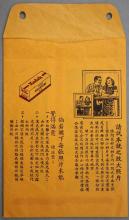70 years ago: Hong Kong's wartime diaries
17 Jul 1943, R. E. Jones Wartime diary
Submitted by Admin on Sun, 2013-06-30 03:50Book / Document:Date(s) of events described:Sat, 17 Jul 1943Showery.
Working on Dr Hasketts hold-all.
No swim, no G today.
Choir practice 10-11AM.
Talk with Steve pm.
Bulletin re interview with Hatori told us very little. Not much hopes of any improvement.
Hungry.
17 Jul 1943, Eric MacNider's wartime diary
Submitted by chrisbartlett on Wed, 2014-07-16 22:46Book / Document:Date(s) of events described:Sat, 17 Jul 1943Youth concert ((for details see 15th July))
17 Jul 1943, W J Carrie's wartime diary
Submitted by kathrynsa on Thu, 2019-10-03 08:35Book / Document:Date(s) of events described:Sat, 17 Jul 1943Letter No 16 turned up 2 days ago - I've been lucky, I've had 9 and lots of people have had much less and a few have still not heard at all. I have Nos 4, 5, 6, 8, then 15, 16, 17, 18 and No 20. The last one was the greatest thrill of course. Then your Red Cross forms of 23/12 & 20/1/43! were of course still better - we are not allowed to send replies on them as we are supposed to have a monthly letter. I did send in replies - so I must try to get my forms back to keep. No more news and very weary. The landings on Sicily have, however, cheered us up - the end is just around the corner now. AML. B.
17 Jul 1943, John Charter's wartime journal
Submitted by HK Bill on Sun, 2021-08-15 11:50Book / Document:Date(s) of events described:Sat, 17 Jul 1943About a fortnight ago, eleven more people came in, chiefly bank people. Alec Kennedy was amongst them; he had spent the early days of internment in this camp, then was taken to town by the Japs to assist with the business of liquidating the HK Shanghai Bank. He has now returned and when I asked him if he was glad he said, “Well, yes and no. We had more freedom outside and felt we were more in touch with things; but it’s much pleasanter living out here”.
He said there were still quantities of tinned food in the Chinese shops but the owners would only sell a small amount at a time and then say they had sold out. What they do is to sell enough to buy rice and food for themselves and those they support, and then shut down. Prices are continually rising, so it would not pay for them to sell more than they have to at a time. In fact I suppose food is one of the best investments these days. Alec also said there was quite a lot of flour about still, but it was very difficult to get for the same reason. Prices are beginning to shoot up now.
Yesterday, 29 more people came in. 17 were British, all of them bank people and their families (HK Bank, Chartered and Mercantile); 10 were Dutch, also bankers; and two were Norwegians.
I hear the war news is excellent. Of course we have been thrilled of late by the news of the British and American invasion of Sicily which started on 7th July. Reading between the lines of the local paper, it is evident that our forces are making headway in spite of all the reports which would lead us to believe our forces have only a few more hours left before they are hurled back into the sea. We hear, actually, that they are doing magnificently; also the Russians on the Eastern front are hurling in simply huge numbers of men and tanks – so much so that the Germans, who started the offensive recently, cannot cope with the numbers, and their much heralded offensive is petering out. What millions of lives must have been lost on that front.
Today, 15 of us, under Drs Macleod and Mackie (the latter is HK’s malariologist) and escorted by Mr Yamashita, set out at 8.30 a.m. on an anti-malarial expedition. We carried with us hand sickles and a few spades and set to work to clear the rain water channels in the flat and over grown field or plot below the Prep School. This was outside the camp barbed wire boundary fence, and it was really quite pleasant to be beyond the confines of the camp. We cut back the dense and over hanging grass at the edge of the cement ditches and dug the earth and weeds out of some of the shallower ones which were completely choked up.
Dr Mackie tested the water with the aid of his little dipper and he showed me specimens of the anopholea or larvae of the malaria mosquito. They look rather like longish black or grey seeds (a dandelion seed, only bigger) and lie along the surface of the water (just submerged) and not at right angles to it as do most mosquito larvae. Down in this field were forty graves. Macleod said they were all new since he visited the site six months earlier, so this must be the burial ground of the unfortunate Chinese who have died recently in prison. We periodically see a gang of Chinese coolies emerging from the prison with pick and shovel and a coffin.
Today is Pop’s birthday. Many happy returns Pop.

